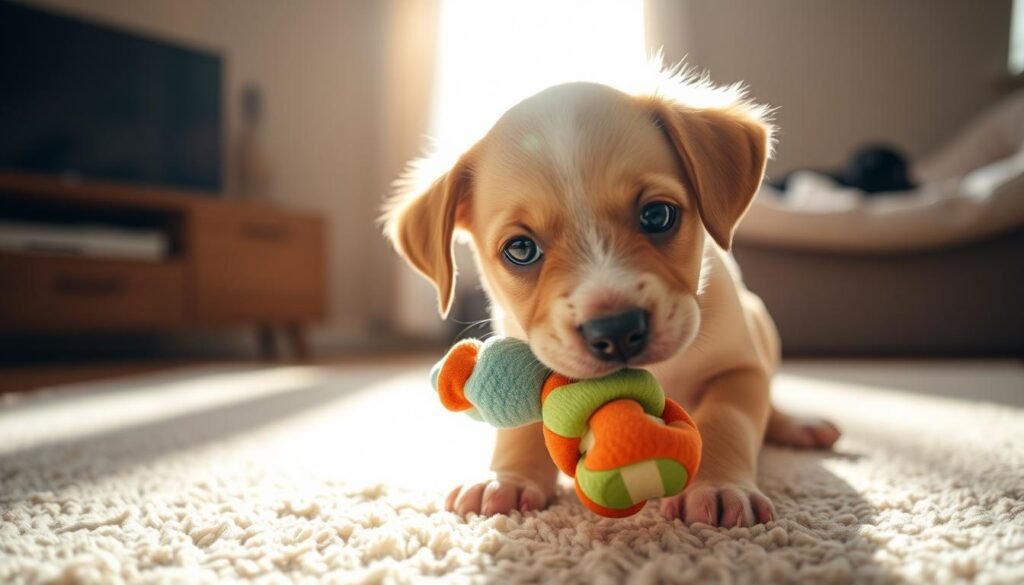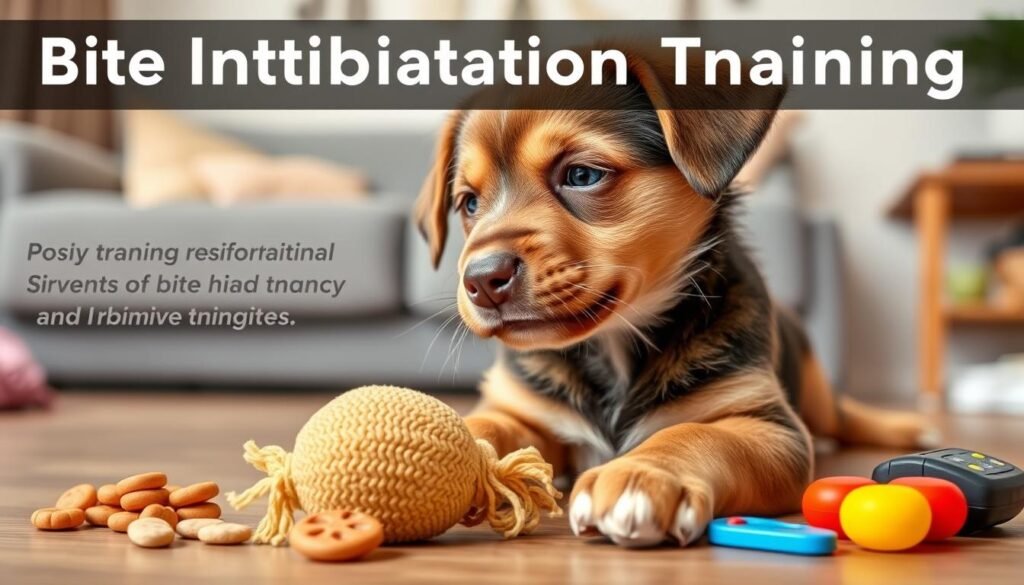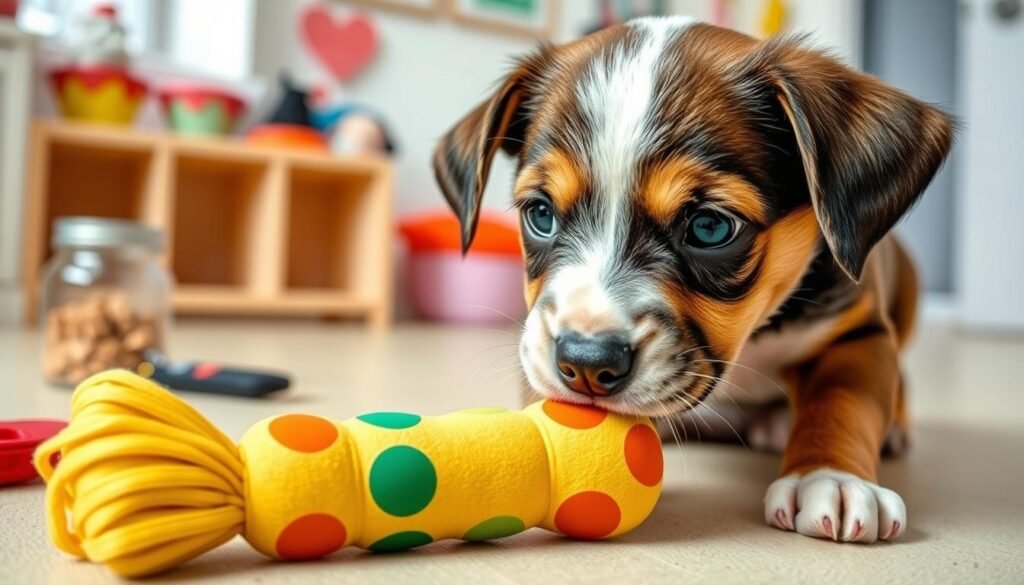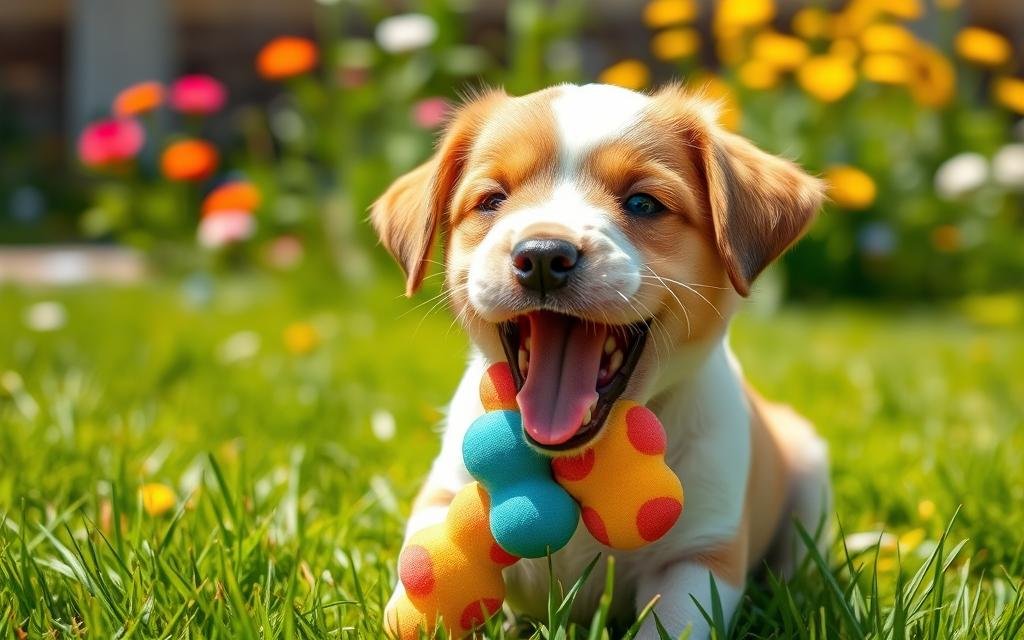Bringing home a new puppy is exciting. But, it also means learning to manage their biting. Teaching them not to bite is key to having a well-behaved dog. Puppies have tiny teeth that love to chew on fingers or toes1.
Puppies bite to explore, play, and ease teething pain. It’s normal, but we need to teach them better ways to do these things. Positive training, redirecting, and consistent practice can help12.
Getting your puppy into a class like AKC S.T.A.R. Puppy is a great idea. These classes let them play with others and learn not to bite12.
Puppies who learn not to bite are less likely to bite as adults1. If your puppy still bites at six months, get help from a dog trainer or behavior specialist1.
Key Takeaways
- Puppies use their mouths to explore, play, and relieve teething discomfort
- Positive reinforcement, redirection, and consistent training can help curb biting behavior
- Puppy classes provide socialization and teach bite inhibition through supervised play
- Puppies who learn bite inhibition are less likely to grow into adult dogs who bite
- Consult a professional if biting persists beyond 6 months of age
Understanding Why Puppies Bite and Nip
Puppies are naturally curious and explore their world by mouthing and biting. This behavior is key to their social growth and teething3.
Natural Exploration Through Mouthing
Puppies use their mouths to learn about their world and interact with others. This is a vital part of their early development4.
Teething Process and Discomfort
Teething, which starts at 3-4 months and lasts until 6-7 months, is very uncomfortable for puppies4. They chew and bite more to find relief from this pain5.
Play Behavior and Social Development
Biting and nipping are part of a puppy’s play, helping them learn to control their bite. This play is crucial for their social skills3. However, they may keep biting even into their second year, making training a long journey5.
Understanding why puppies bite is key. It could be due to too much energy, being overtired, seeking attention, fear, or anxiety4. By knowing the cause, owners can train their puppies to stop this behavior.

Some breeds, like herding dogs, nip naturally for herding. These dogs need special training to manage their instincts4. Also, active breeds tend to bite more. Families with these dogs need to prepare for training and exercise5.
“Understanding the motivation behind a puppy’s nipping is crucial, as they might nip for different reasons related to play, overstimulation, chasing instincts, boredom, tiredness, seeking attention, hunger, or teething discomfort.”4
By knowing why puppies bite, owners can create effective training plans. This helps their puppies become well-behaved dogs.
The Importance of Bite Inhibition Training
Bite inhibition is key for puppies to learn. It helps them control their bites and avoid injuries later on6. This training is vital for socialization, reducing the risk of harmful bites6. It also makes playtime safer, reducing aggression6.
The training process has several stages7. First, puppies learn to bite softer by startling them with a high-pitched sound7. Later, they learn to bite less often, using cues like “take it” and “drop it”7.
Using consistent training methods is essential67. Redirecting bites to toys and setting limits are key. Punishing puppies for biting can make things worse6.
It’s important for everyone in the family to learn about bite inhibition6. This ensures the puppy gets consistent training. Proper training prevents injuries and promotes safer interactions8.

Bite inhibition training is vital for puppy socialization and development. It teaches puppies to control their bites, preventing injuries and promoting safer interactions678.
How to Stop a Puppy from Biting: Essential Steps
Puppy biting can be frustrating, but it’s not impossible to stop. The right approach is patience, consistency, and positive reinforcement. Let’s look at the key steps to stop your puppy from biting.
Positive Reinforcement Techniques
Positive reinforcement is the best way to stop puppy biting. Reward your puppy with praise, treats, or attention when they don’t bite. This teaches them that gentle actions are what you want9. It also strengthens your bond with your puppy.
Redirecting Biting Behavior
When your puppy bites, quickly give them a chew toy or puzzle10. This stops the biting and gives them a good way to chew. Having many toys helps you quickly change your puppy’s focus and stop biting.
Teaching Gentle Play Techniques
Play games like fetch or tug-of-war to teach your puppy gentle play11. These games use up their energy and teach them to play nicely. Always end playtime positively to reinforce good behavior.
By following these steps, you can stop your puppy’s biting and raise a well-behaved pet. Remember, patience, positive reinforcement, and training are key to solving this problem.

Using Time-Outs Effectively
As a responsible pet owner, using puppy time-outs12 is a great way to manage biting. Dogs are social and love being with people12. By setting time-outs, you teach your puppy that biting means no play or attention.
It’s important to act fast when using time-outs12. Waiting too long can make the consequence less effective12. If your puppy bites, say “Ouch!” and remove them for 30 seconds to 2 minutes13. This helps them calm down and think about their actions.
Being consistent is key when using time-outs12. Everyone in the house should use this method the same way12. Choose a quiet spot for time-outs to show biting means no fun12.
Puppies might need shorter time-outs, like 5-10 seconds12. Some dogs might need to learn through many time-outs12. Stay calm during time-outs to avoid making things worse12.
If your dog whines or barks during a time-out, stay firm12. Don’t let them out until they’re calm12. Try to prevent bad behavior with positive training instead of time-outs12.
Time-outs can help teach your puppy what’s okay and what’s not121314. Remember, being consistent, patient, and calm is crucial for success.
Appropriate Chew Toys and Training Tools
As a puppy parent, it’s vital to give the right chew toys and training tools. Puppies need to chew, and the right toys can keep them from biting your hands or furniture15. Try tethering young puppies or letting them drag a leash to manage their behavior15.
Selecting the Right Toys
Puppies need 10-15 toys to avoid bad behaviors15. Choose durable toys like rubber or nylon for teething. Frozen toys or ice cubes can also help with teething pain16.
Change the toys often to keep your puppy interested. This prevents boredom and chewing on things they shouldn’t.
Using Deterrent Sprays
If your puppy still chews on things they shouldn’t, use a taste deterrent spray. These sprays taste bad and can stop your puppy from biting. But use them carefully and only when needed.
Interactive Toy Options
Interactive toys like Kongs or puzzle toys keep your puppy busy and stop biting15. These toys also teach your puppy to chew on the right things. Playing with your children can help bond your puppy with your family15.
Be consistent and patient when introducing new toys and training. Watch your puppy during playtime and replace any broken toys. With the right toys and training, you can stop your puppy’s biting and help them grow.
“Providing appropriate chew toys and training tools is crucial for redirecting a puppy’s natural biting instincts and establishing positive behaviors.”
Managing Energy Levels to Reduce Biting
Puppies have lots of energy, which can make them bite more. To manage their energy and cut down on biting, you need a few strategies17.
It’s important to give your puppy regular exercise and mental challenges. Play games like fetch or tug-of-war, or take them on short walks. This helps them use up their energy18. Also, use interactive toys to keep their minds busy and prevent boredom, which can lead to biting17.
Having a set routine with nap times is also key. Puppies, like people, can get too tired and start biting more17. Use the NILIF (Nothing In Life Is Free) method. This means your puppy must do something before getting a treat, teaching them self-control and reducing biting17.
A well-exercised and rested puppy bites less. By mixing physical and mental activities, training, and routine, you can lower biting and build a better bond1718.
Keeping a balance in managing energy, with positive rewards and clear rules, helps your puppy control their biting18.
“A tired puppy is a good puppy” – Puppy Training Expert
Establishing Consistent Training Boundaries
As a puppy parent, setting clear training boundaries is key. It helps your furry friend learn right from wrong. Make sure all family members agree on rules to stop unwanted biting19.
Setting Clear Rules
Don’t let your puppy mouth or bite by not using hands as toys. Teach them hands are for petting, not chewing. Use the same commands and responses for biting, so everyone knows what to do20.
This creates a clear environment for your puppy. They’ll know what’s okay and what’s not21.
Family Involvement in Training
It’s important for all family members to train together. Everyone should use the same methods and words with your puppy. This unity makes training faster and strengthens your puppy’s bond with each family member19.
Training together also builds a strong bond between your puppy and everyone. This leads to a lifetime of positive relationships20.
With clear rules and a united family, your puppy will grow into a well-behaved, confident, and loving friend21.
Socializing Your Puppy to Prevent Biting
Proper socialization is key to stopping fear-based biting in puppies. By introducing your pup to different people, animals, and places in a positive way, you boost their confidence. This helps prevent aggressive behavior22.
Putting your puppy in socialization classes is a great step. These sessions let them play with other puppies and learn to control their bites23. Make sure to encourage gentle play and watch interactions closely. This helps keep your puppy’s excitement from turning into fear or aggression that might lead to biting.
- Expose your puppy to a variety of people, animals, and environments in a positive, controlled manner.
- Enroll your puppy in socialization classes to practice bite inhibition and appropriate play behaviors.
- Supervise interactions to prevent overexcitement or fear responses that could trigger biting.
By focusing on socialization, you can equip your puppy with the skills and confidence to interact safely without biting.
“Puppies who learn bite inhibition are less likely to grow into adult dogs who bite, reducing the likelihood of aggressive behavior in the future.”23
Conclusion
Stopping a puppy’s biting needs patience, consistency, and knowing how puppies grow. Use training methods like bite inhibition and positive reinforcement. Also, redirect their attention and give them the right toys24.
It’s important to manage your puppy’s space and energy. Training everyone in the family is key to success. Most puppies will stop biting as they grow up25.
By using the tips from this article, you can stop your puppy from biting. Stay patient, consistent, and use positive reinforcement. This will help you have a happy and well-behaved pet. The training methods mentioned are vital for any dog owner to stop puppy biting.
FAQ
How can I stop my puppy from biting?
Why do puppies bite and nip?
What is bite inhibition, and why is it important?
How can I use positive reinforcement to stop my puppy from biting?
When should I use time-outs for puppy biting?
What types of chew toys should I provide for my teething puppy?
How can I manage my puppy’s energy levels to reduce biting?
Why is it important to establish consistent training boundaries with my puppy?
How can proper socialization help prevent fear-based biting in puppies?
Source Links
- No title found – https://www.akc.org/expert-advice/training/stop-puppy-biting/
- Mouthing, Nipping and Biting in Puppies – https://www.aspca.org/pet-care/dog-care/common-dog-behavior-issues/mouthing-nipping-and-biting-puppies
- Teaching Your Puppy Not to Nip: 6 Tips to Stop the Biting – Old Farm Veterinary Hospital – https://www.oldfarmvet.com/teaching-your-puppy-not-to-nip-6-tips-to-stop-the-biting/
- Dog Trainer Tips: Puppy Nipping and Biting | Preventive Vet – https://www.preventivevet.com/dogs/puppy-nipping-and-biting
- No title found – https://www.akc.org/expert-advice/training/why-does-my-dog-treat-my-arm-like-a-chew-toy-and-playfully-nip-at-me/
- How to Train Your Puppy Not to Bite Hard – https://www.thesprucepets.com/bite-inhibition-training-for-puppies-1118223
- Bite Inhibition Training | Karen Pryor Clicker Training – http://www.clickertraining.com/bite-inhibition-training
- Dog Bite Inhibition: Why it Matters and How to Teach it – https://www.kinship.com/dog-behavior/dog-bite-inhibition
- How To Stop a Puppy From Biting – https://www.petmd.com/dog/training/puppy-biting
- 5 Steps to Get Your Puppy to Stop Biting – https://yourpetandyou.elanco.com/us/behavior/5-steps-to-stop-your-puppy-from-biting-and-nipping
- No title found – https://www.akc.org/expert-advice/training/puppy-mouthing-expert-tips/
- Microsoft Word – Time outs 12.doc – https://www.rspcaqld.org.au/~/media/files/animal training fact sheets/general puppy/time_outs_12_v2_14003.ashx?la=en
- Time Outs – https://www.thinkingoutsidethecage.org/pet-resources/behavior-help/dog-behavior-help/time-outs-2/
- Tips from a Top Dog Trainer – https://theonlinedogtrainer.com/effective-timeout-for-dogs-dog-trainer-tips/
- How Do You Train Your Puppy Not to Bite Using Positive Reinforcement? | Beyond the Dog – https://beyondthedogtraining.com/puppy-training/how-do-you-train-your-puppy-not-to-bite-using-positive-reinforcement/
- How To Train Your Puppy Not To Bite You – https://www.familypupz.com/blog-2/how-to-train-a-puppy-not-to-bite-you
- Puppy Biting – Managing Excitement and Self-Control – https://shibashake.com/dog/puppy-biting-tips-solutions/
- How to Stop Your Puppy from Biting – https://nexgard.com.au/pet-care/puppy-care/how-to-stop-puppy-biting
- No title found – https://www.akc.org/expert-advice/training/how-to-establish-a-routine-and-boundaries-with-your-puppy/
- Aggressive Puppy Biting – Learn What To Do – https://suburban-k9.com/how-to-stop-puppy-biting/
- How to stop your puppy from biting your hands – OneMind Dogs – https://www.oneminddogs.com/blog/stop-puppy-biting-hands/
- Puppy Socialization: Bite Inhibition – East Valley K9 Services – https://eastvalleyk9.com/puppy-socialization-bite-inhibition/
- How To Teach Your Puppy To Stop Biting | Eukanuba – https://www.eukanuba.com/nz/puppy/puppy-articles/how-to-teach-your-puppy-to-stop-biting
- Safe and Humane Ways to Teach Your Puppy How to Stop Biting – https://www.pupbox.com/training/safe-humane-ways-teach-puppy-stop-biting/?srsltid=AfmBOoqdJmV9E7bDBZvvayzNhRcM0NyIjaCtQPtuC43YwKFmZ_5Fp8i7
- How to stop a puppy from biting? – https://animalhotels.com/gb/blog/dogs/how-to-stop-a-puppy-from-biting

